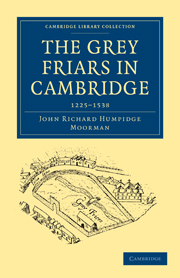Book contents
- Frontmatter
- Contents
- PLATES
- MAPS AND PLANS
- Preface
- Chapter I The House of Benjamin the Jew: 1225–1267
- Chapter II The Friars and the University: 1225–1306
- Chapter III The New House
- Chapter IV Domestic Affairs
- Chapter V Some Activities of the Friars
- Chapter VI The Franciscan School at Cambridge in the Fourteenth Century
- Chapter VII The Latter Years
- Chapter VIII The Dissolution and After
- Appendix A Custodes, Wardens, Vice-wardens and Lectors
- Appendix B Biographical Notes on Cambridge Franciscans
- Appendix C The Dispute between the Friars and the University of Cambridge, 1303–6
- Appendix D James Essex's Observations on the Old Chapel of Sidney College in Cambridge
- Appendix E Fragment of an Account-book belonging to the Cambridge Franciscans
- Appendix F Legacies
- Appendix G Documents connected with the Dissolution
- Appendix H Seals of the Cambridge Franciscans
- Index
- Plate section
Chapter VII - The Latter Years
Published online by Cambridge University Press: 07 September 2010
- Frontmatter
- Contents
- PLATES
- MAPS AND PLANS
- Preface
- Chapter I The House of Benjamin the Jew: 1225–1267
- Chapter II The Friars and the University: 1225–1306
- Chapter III The New House
- Chapter IV Domestic Affairs
- Chapter V Some Activities of the Friars
- Chapter VI The Franciscan School at Cambridge in the Fourteenth Century
- Chapter VII The Latter Years
- Chapter VIII The Dissolution and After
- Appendix A Custodes, Wardens, Vice-wardens and Lectors
- Appendix B Biographical Notes on Cambridge Franciscans
- Appendix C The Dispute between the Friars and the University of Cambridge, 1303–6
- Appendix D James Essex's Observations on the Old Chapel of Sidney College in Cambridge
- Appendix E Fragment of an Account-book belonging to the Cambridge Franciscans
- Appendix F Legacies
- Appendix G Documents connected with the Dissolution
- Appendix H Seals of the Cambridge Franciscans
- Index
- Plate section
Summary
Lollardy was perhaps the chief problem with which the Church in England had to deal in the fifteenth century. Up till then England had been practically free from heresy. When the returning Crusaders brought back with them from the East ideas which were not in line with the orthodox teaching of the Church, or when social unrest gave birth to bitter criticism of the clergy and the demand for a religion without priest or sacrament, England seems to have been strangely unaffected. Consequently the movement initiated by John Wyclif towards the end of the fourteenth century put both Church and State very much on their guard. In 1401 Parliament passed the savage statute De haeretico comburendo, and in the same year that ‘malleus haereticorum’, Archbishop Arundel, visited the University of Cambridge and demanded ‘whether any were suspected of Lollardism or any other heretical pravity’. The answer must have been a negative one, for Cambridge at this time appears to have preserved a blameless orthodoxy, so that in later years the poet Lydgate could write:
‘By recorde all clarkes seyne the same
Of heresie Cambridge bare never blame’.
In this ‘blameless’ atmosphere the school of the Franciscans at Cambridge continued to produce able men who could take their part in the religious controversies of the time.
- Type
- Chapter
- Information
- The Grey Friars in Cambridge1225–1538, pp. 114 - 126Publisher: Cambridge University PressPrint publication year: 2009First published in: 1952



